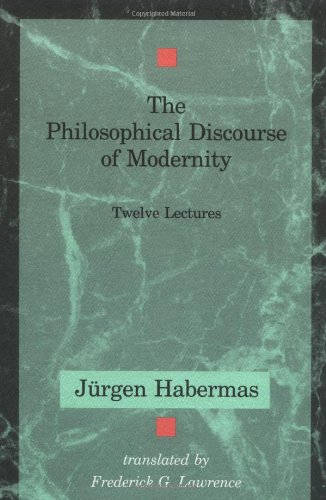The Philosophical Discourse of Modernity epub
Par fisher irene le dimanche, février 12 2017, 00:46 - Lien permanent
The Philosophical Discourse of Modernity. Frederick Lawrence, Jurgen Habermas, Thomas McCarthy

The.Philosophical.Discourse.of.Modernity.pdf
ISBN: 0745608303,9780745608303 | 456 pages | 12 Mb

The Philosophical Discourse of Modernity Frederick Lawrence, Jurgen Habermas, Thomas McCarthy
Publisher: Polity Press
(1987) The Philosophical Discourse of Modernity. Nihilism in critiquing disciplinary power or offering alternative models based in the care of the self, for instance, he is engaging in “crypto-normativity” (Habermas' term in The Philosophical Discourse of Modernity, 1992). For short accounts relevant for the present purpose, see Habermas, Jurgen, The Philosophical Discourse of Modernity, translated by Frederick G. Postmodernism, one might say, is the revenge of the philosophical discourse of modernity upon Marixsm for neglecting problems in the philosophy of history. The Philosophical Discourse of Modernity; Moral Consciousness and Communicative Action. It begins by comparing Levinas' and Habermas' articulations of the philosophical problems of modernity. Jürgen Habermas also employs excursuses (the English plural; not “excursi,” if we followed the Latin) in his masterful overview, The Philosophical Discourse of Modernity (1987). Frederick Lawrence (Cambridge, Mass., 1987), 131. This raises more general questions about the differences between a critical social theory and a critical philosophical position, and illuminates the limitations of the latter. Everyday life is lived in the medium of cultural form. Since the 1960s the Frankfurt School has been guided by Jürgen Habermas' (born 1929) work on communicative reason, linguistic intersubjectivity and what Habermas calls “the philosophical discourse of modernity“. Jurgan Habermas, “The Entwinement of Myth and Enlightenment: Max Horkheimer and Theodor Adorno,” in The Philosophical Discourse of Modernity: Twelve Lectures, Cambridge: MIT Press, 1987, pp. Specters of Marx is divided into five chapters organized around the central conception of spectrality — that which is not Jürgen Habermas, The Philosophical Discourse of Modernity, transl. (1999) The Social Construction of What?” Cmabridge, MA: Harvard University Press. An attempt at a reevaluation of Neo-Kantianism, on the contrary, is to be found in Jiirgen Habermas, The Philosophical Discourse of Modernity, trans. Lawrence (Cambridge, Mass: MIT Press, 1987). Cambridge, MA: MIT Press, 1990. This article examines Levinas as if he were a participant in what Habermas has called `the philosophical discourse of modernity'.